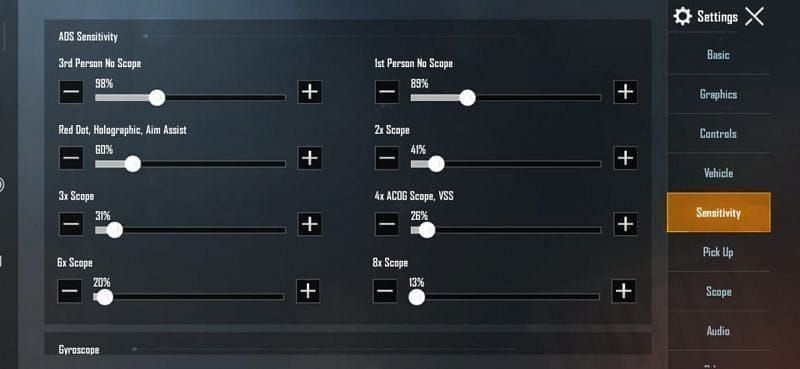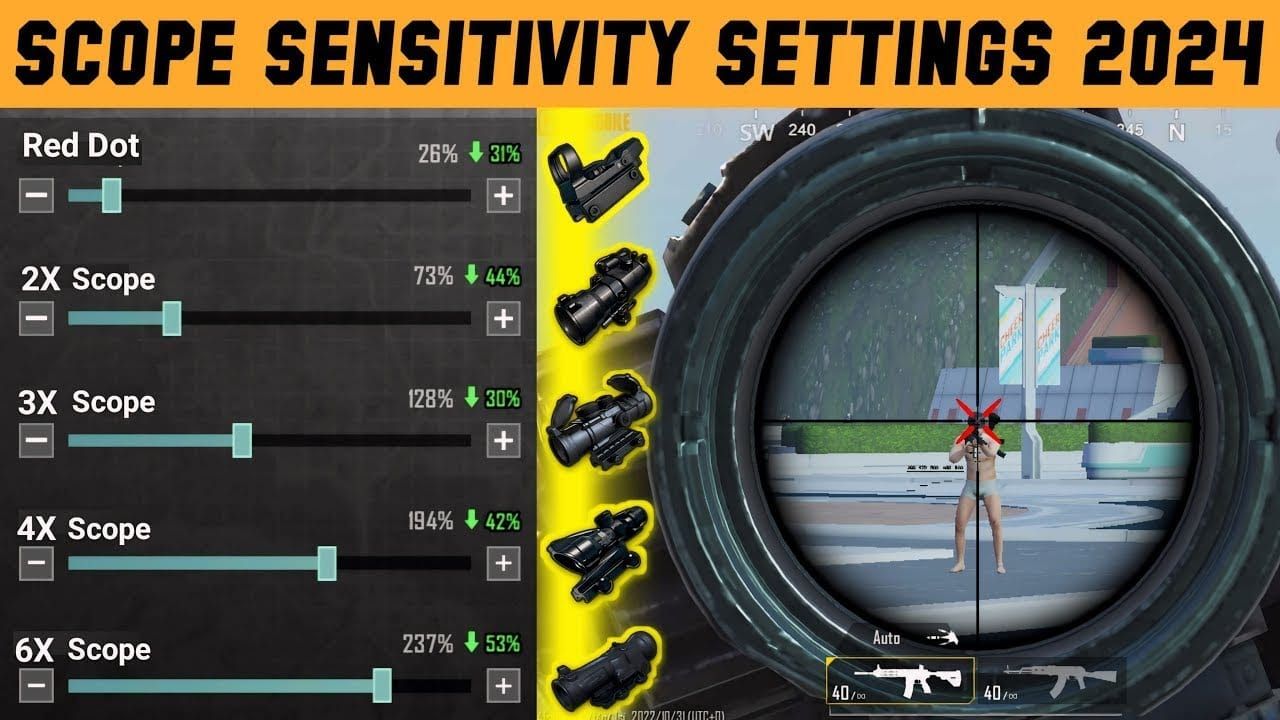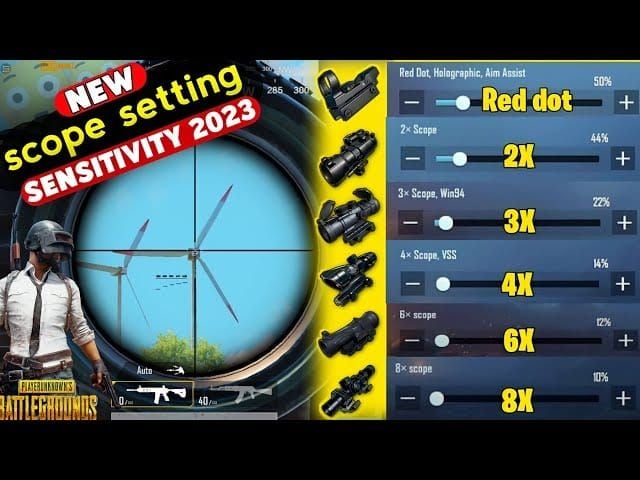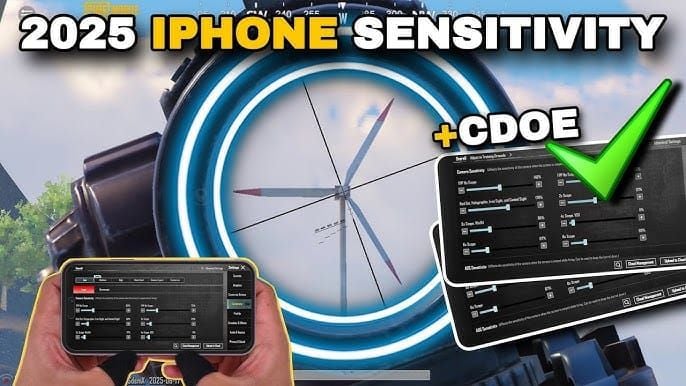Understanding PUBG Mobile Scope Sensitivity Fundamentals
What is Scope Sensitivity
Here’s something that trips up a lot of players – ADS (Aim Down Sight) sensitivity isn’t the same as camera sensitivity. Think of it this way: camera sensitivity is how fast you can scan around while looking through your scope, but ADS sensitivity? That’s what actually controls your crosshair when you’re pulling the trigger.

Each scope gets its own sensitivity slider, which is honestly brilliant design. You can dial in your 6x for those 300-meter headshots while keeping your 3x snappy for mid-range fights. And then there’s gyroscope sensitivity – this lets you tilt your device for micro-adjustments. I’ve seen players completely transform their game once they nail this dual-input setup: thumbs for big movements, gyro for the fine stuff.
How Sensitivity Affects Long-Range Accuracy
Let me be blunt – if you’re running default sensitivity settings, you’re probably missing shots you should be hitting. For 6x engagements beyond 200 meters, that sweet spot of 10-25% sensitivity gives you the control to land those satisfying single taps and controlled bursts. Too high? You’ll overshoot. Too low? Good luck tracking that guy sprinting between compounds.
The 3x scope operates in a different world entirely. Mid-range combat demands that 20-50% range because you need to balance precision with the ability to track moving targets. I’ve watched countless players struggle because they treat all scopes the same – big mistake.
Lower sensitivity provides rock-solid stability but kills your tracking speed. Higher sensitivity lets you snap to targets faster but increases that dreaded overshooting risk. It’s all about finding your personal balance point.
Camera vs Scope Sensitivity Differences
This distinction confused me for months when I started playing seriously. Camera sensitivity affects how you scan for targets while scoped, but it won’t help you control recoil one bit. That’s purely ADS territory.
For 6x scopes, I recommend camera sensitivity between 10-25% for stable target acquisition – you don’t want to be whipping around like you’re on a sugar rush. The 3x scope camera sensitivity works best between 20-65% since you need faster scanning for those dynamic mid-range fights.
Remember: ADS sensitivity only kicks in when you’re actually firing. That’s why it’s absolutely critical for accuracy.
Optimal 6x Scope Sensitivity Settings
Recommended 6x Sensitivity Ranges
After analyzing hundreds of gameplay sessions (yes, I’m that obsessive), here’s what actually works:

Sniper-focused players should stick to 10-13% for maximum precision with bolt-action rifles. If you’re the type who loves those satisfying Kar98k headshots, this range is your friend. Players using 6x on assault rifles and DMRs need that 15-20% sweet spot – it’s the perfect balance between control and responsiveness.
Now, advanced players running aggressive long-range tactics can push 20-25%, but fair warning – this requires serious practice to maintain accuracy. Don’t jump straight to 25% and expect miracles.
Device-Specific 6x Settings
Here’s where it gets technical, but stick with me. High-refresh-rate devices (90Hz/120Hz) can actually handle 2-3% higher sensitivity because of improved touch responsiveness. It’s a small difference, but at this level, small differences matter.
Tablets and phones with 6.5+ inch screens benefit from 15-18% sensitivity to maintain consistent aim movement ratios. The physics of finger movement across larger screens demands this adjustment. Lower-end devices with 60Hz displays should stick to the 10-15% range to compensate for input lag – trust me on this one.
6x Sensitivity for Different Weapons
Not all weapons are created equal with 6x scopes:
Bolt-action rifles (AWM, M24, Kar98k): 10-15% for single-shot precision
DMRs (SLR, SKS, Mini14): 15-20% for semi-automatic follow-up shots
Assault rifles with 6x: 18-25% for full-auto recoil control
The recoil patterns are completely different, so your sensitivity needs to match.
Perfect 3x Scope Sensitivity Configuration
Best 3x Sensitivity Values
The 3x scope is where most players either shine or completely fall apart. Support players focusing on controlled burst fire achieve best results with 20-25% sensitivity – it’s methodical and precise. Aggressive players who love getting in people’s faces during close-to-mid range combat need that 35-50% range for rapid target tracking.

For balanced players (probably most of you reading this), 25-35% sensitivity offers adequate precision while maintaining responsiveness. It’s not flashy, but it works.
3x Scope vs 6x Scope Sensitivity Ratios
Here’s a pro tip that changed my game: maintain a 1.5:1 to 2:1 ratio between your 3x and 6x sensitivity. So if you’re running 15% for 6x scopes, configure your 3x around 25-30%. This maintains proportional control and creates smooth transitions when switching between scopes mid-fight.
Close-to-Mid Range 3x Optimization
Distance matters more than most players realize:
Under 100 meters: 30-40% sensitivity for tracking moving targets
100-200 meters: 25-35% for improved precision during controlled bursts
Mixed-range combat: 30% as a compromise setting across all distances
For enhanced long-range performance, explore Long range players UC top up deals for premium weapon skins and attachments that complement optimized sensitivity settings.
Device-Specific Sensitivity Optimization
iOS Device Sensitivity Settings
iOS devices are beautifully consistent with touch response, which means you can typically run 2-5% higher sensitivity than equivalent Android devices. iPad users need significant adjustments though – we’re talking 12-18% for 6x scopes and 25-35% for 3x scopes because of that larger screen real estate.

High-end iOS devices with ProMotion displays (120Hz) can handle upper-range sensitivity values thanks to superior touch responsiveness. It’s one of those advantages that actually matters in competitive play.
Android Device Configurations
The Android ecosystem is… complicated. Flagship devices with high refresh rates can match iOS-equivalent sensitivity values, but mid-range Android devices should stick with conservative settings (10-20% for 6x, 20-40% for 3x) for consistent performance.
Gaming-focused Android devices with specialized touch optimization – like ROG phones or Black Shark devices – can handle aggressive sensitivity settings at the upper recommended limits. These devices are built for this stuff.
Screen Size Impact on Sensitivity
Size really does matter here:
Screens under 6 inches: Increase sensitivity by 10-15% across all scopes
Large screens (6.5+ inches): Reduce sensitivity by 5-10% to prevent overshooting
Ultra-wide aspect ratios: Reduce sensitivity by 3-5% for that extended horizontal space
Pro Player Sensitivity Analysis
Top PMPL Player Settings
Let’s talk about what the pros actually use (not what they claim in interviews). Jonathan runs an aggressive 4-finger claw with ADS Gyroscope settings of 300% for red dot and 236% for 3x scopes. That’s… intense.
ScoutOP takes a hybrid approach with ADS sensitivity of 55-60% for red dot and gyroscope sensitivity of 60-65% for 3x scopes. These serve as baseline references, but you’ll need 5-10% adjustments for your specific device.
Regional Meta Differences
This is fascinating – Asian pros consistently favor lower sensitivity with heavy gyroscope integration for precision-focused gameplay. Western players lean toward higher sensitivity with less gyroscope dependence, favoring aggressive positioning over pure precision.
Middle Eastern and European players? They’ve developed hybrid approaches combining moderate sensitivity with selective gyroscope usage. Different regions, different metas.
Tournament-Proven Configurations
Here’s what actually wins tournaments: configurations consistently featuring 10-25% for 6x scopes and 20-50% for 3x scopes. Championship teams often standardize sensitivity ranges within squads for consistent callouts and tactical coordination.
But here’s the kicker – most successful players demonstrate mastery through consistent practice rather than constantly tweaking settings. Food for thought.
Step-by-Step Sensitivity Setup Guide
Initial Sensitivity Testing
Start simple. Begin with baseline values: 15% for 6x scopes and 30% for 3x scopes. Head to Training Ground and run through the basics – single taps with bolt-action rifles, burst fire with assault rifles, sustained fire with DMRs.

Document everything. How does the aim speed feel? Precision? Comfort level? This isn’t just about performance; it’s about sustainability during those marathon gaming sessions.
Fine-Tuning Process
Patience is key here. Adjust sensitivity in 2-3% increments based on your testing results. Crosshair movement feels sluggish? Increase gradually. Overshooting targets? Reduce incrementally.
Test each adjustment through structured drills: long-range tapping, mid-range burst control, close-range tracking. Keep detailed records of changes and performance effects – you’ll thank me later when you need to troubleshoot.
Practice Drill Implementation
Daily consistency beats weekend marathons:
10-15 minute sessions with spray control drills on stationary targets
Moving target tracking using Training Ground’s mobile targets
Long-range precision drills targeting distant objects (that silo is perfect)
Practice leading shots and maintaining crosshair placement during movement
Players maximizing long-range potential can benefit from Midasbuy UC top up event bonuses for premium weapon skins enhancing visual clarity and aiming precision.
Common Sensitivity Mistakes to Avoid
Oversensitive Settings Problems
I see this constantly – players cranking sensitivity way too high thinking it’ll make them faster. Excessively high sensitivity causes aim overshooting and kills precision during sustained fire. Values above recommended ranges create inconsistent performance under pressure, which is absolutely brutal during final circles.
Solution? Gradually reduce by 5-10% increments while maintaining consistent practice. Your muscle memory will thank you.
Undersensitive Configuration Issues
The opposite problem is equally frustrating. Insufficient sensitivity creates sluggish response that hampers target tracking and quick adjustments. Values below recommended ranges cause fatigue during extended sessions because of increased finger movement requirements.
Address this by increasing values gradually while maintaining precision focus. It’s a delicate balance.
Inconsistent Sensitivity Patterns
Here’s a big one – using uniform values across all scopes creates suboptimal performance due to magnification differences. Copying pro settings without considering device differences leads to poor performance every time.
And please, stop changing settings constantly. Frequent changes prevent muscle memory development. Commit to specific settings for extended periods rather than adjusting every few games.
Advanced Long-Range Techniques
Recoil Compensation with Proper Sensitivity
For assault rifles with 6x scopes, stick to single taps or short bursts beyond 150 meters. ADS gyroscope sensitivity of 101-120% for 6x scopes enables precise recoil management that actually works.
Weapon-specific patterns require adjusted compensation: AKM demands stronger downward control, M416 requires horizontal compensation for that diagonal recoil pattern. Learn these patterns – they’re not optional at higher levels.
Movement and Scope Tracking
Always maintain crosshair placement ahead of moving targets to compensate for bullet travel time beyond 200 meters. Utilize Peek and Fire feature to minimize exposure while maintaining accuracy.
Crouch-firing significantly improves accuracy and recoil control, perfectly complementing optimized sensitivity settings. It’s a simple technique that makes a huge difference.
Target Leading and Prediction
Distance-specific aiming points:
100 meters: Place chevron tip on target’s body
200 meters: Position bottom of crosshair on target
Beyond 300 meters: Use scope’s lower reference points for bullet drop
Moving targets: Lead based on speed and direction relative to your position
Practice Methods and Performance Tracking
Training Ground Exercises
Establish structured routines starting with stationary target spray control for warm-up. Progress to Recoil Lab for detailed spray pattern analysis and immediate feedback – this tool is underutilized by most players.
Practice long-range precision using distant targets (silo, helipad, far buildings) to develop fine motor control and validate your 6x sensitivity settings. Consistency here translates directly to match performance.
Cheer Park Practice Routines
Cheer Park offers a dynamic environment perfect for realistic target tracking with moving targets and varied engagement ranges. Practice quick scope transitions between magnification levels to ensure natural sensitivity ratios.
Engage in friendly competitions to test settings under pressure and identify configuration issues. Sometimes you don’t know what’s wrong until someone’s shooting back.
Performance Metrics to Monitor
Track hit percentage improvements over time at different ranges to validate your optimization efforts. Monitor spray pattern consistency across multiple sessions – consistent performance indicates well-optimized settings.
Evaluate comfort level and fatigue during extended sessions for sustainable gameplay. If your hand hurts after an hour, something’s wrong with your setup.
For serious long-range improvement, consider Buy PUBG UC for scope skins and more to access weapon customizations enhancing visual clarity during crucial long-distance engagements.
Frequently Asked Questions
What is the best 6x scope sensitivity for PUBG Mobile? The optimal range is 10-25%, with 15-20% being the sweet spot for most players. Sniper-focused players should use 10-13% for maximum precision, while aggressive players can push 20-25%. Start with 15% and adjust in 2-3% increments based on Training Ground performance.
How do I find the perfect scope sensitivity for my device? Begin with baseline values (15% for 6x, 30% for 3x) and test extensively in Training Ground. Adjust in 2-3% increments based on aim speed and accuracy. High-refresh-rate devices can handle slightly higher values, while larger screens may require lower sensitivity. Practice consistently for several days before making further changes.
Should I copy pro player sensitivity settings? Use pro settings as references, not direct copies. Jonathan uses 236% ADS gyroscope for 3x, ScoutOP uses 60-65% gyroscope settings. Adjust pro configurations by 5-10% to match your device and playstyle rather than blindly copying exact values – their setups are optimized for their specific devices and years of practice.
What’s the difference between camera and scope sensitivity? Camera sensitivity controls scoped scanning speed without firing, while scope (ADS) sensitivity activates during shooting, impacting recoil control and accuracy. For 6x: use 10-25% camera and 10-25% ADS. For 3x: use 20-65% camera and 20-50% ADS sensitivity. They work together but serve different purposes.
How often should I change my sensitivity settings? Commit to settings for 1-2 weeks minimum before making adjustments. Only change when consistently experiencing specific issues like overshooting or sluggish response. Make small adjustments (2-3%) and test thoroughly before additional changes to preserve muscle memory development. Constant tweaking kills consistency.
What are the most common sensitivity mistakes to avoid? The biggest mistakes include copying pro settings without testing, using uniform sensitivity across all scopes, setting values too high causing overshooting, and changing settings too frequently. Start with recommended ranges, test systematically, adjust each scope individually, and use gyroscope for fine-tuning rather than relying solely on thumb movements.
















